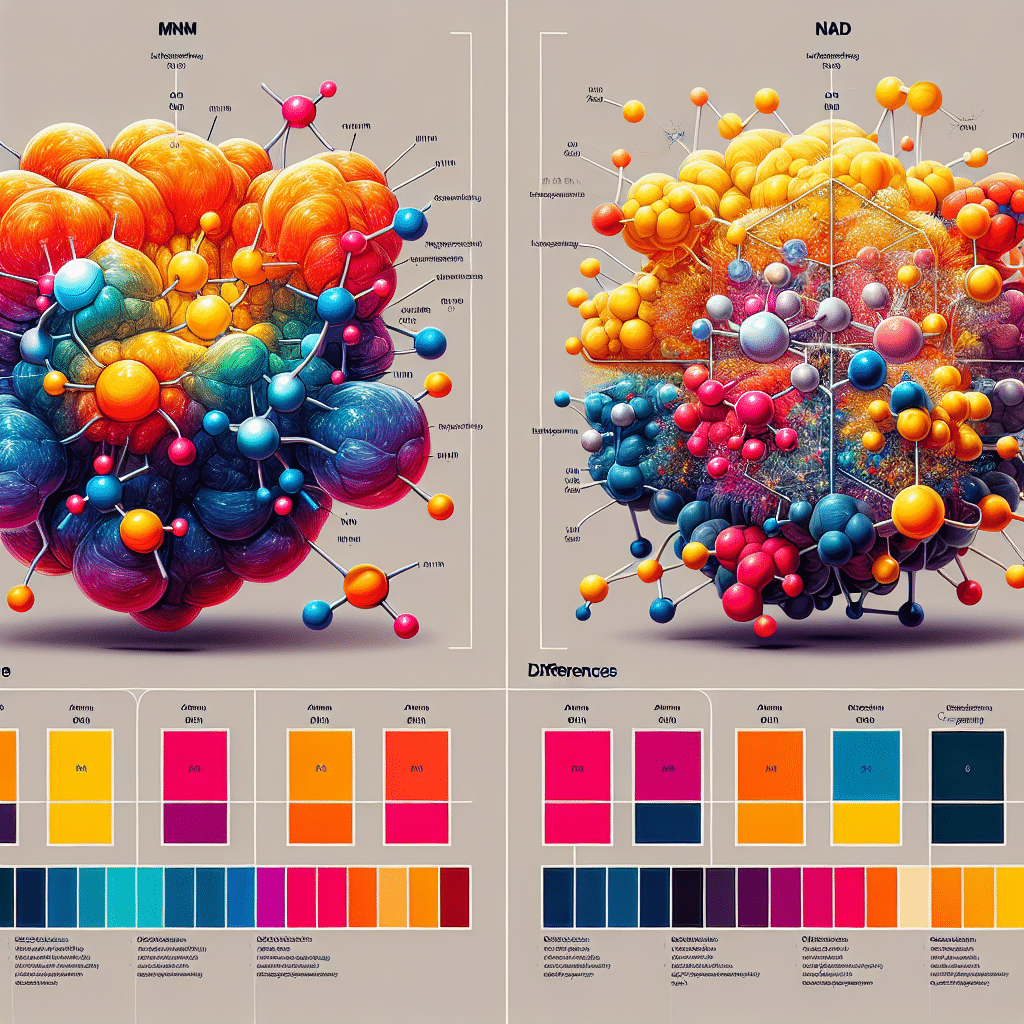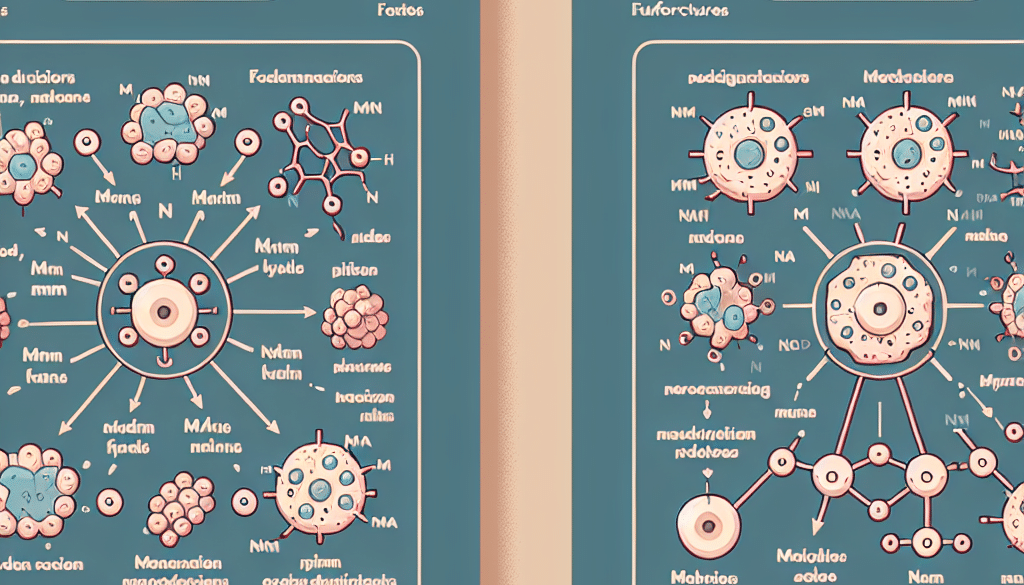Mnm vs NAD: Differences Explained
-
Table of Contents
- MNM vs NAD: Key Differences and Implications for Health
- Understanding MNM and NAD
- What is MNM?
- What is NAD?
- The Role of MNM and NAD in the Body
- MNM’s Role
- NAD’s Role
- Differences Between MNM and NAD
- Chemical Structure and Function
- Supplementation and Bioavailability
- Research and Clinical Studies
- Potential Health Benefits
- Benefits of MNM Supplementation
- Benefits of NAD+ in the Body
- Conclusion: MNM vs NAD in Health and Longevity
- Enhance Your Health with ETChem’s Protein Products
MNM vs NAD: Key Differences and Implications for Health

In the quest for improved health and longevity, scientific research has turned its focus to the molecular level, examining how compounds within our cells influence aging and disease. Two such compounds, MNM (Nicotinamide Mononucleotide) and NAD (Nicotinamide Adenine Dinucleotide), have garnered significant attention for their roles in cellular metabolism and energy production. This article delves into the differences between MNM and NAD, their functions in the body, and the potential health benefits they offer.
Understanding MNM and NAD
Before we explore the differences between MNM and NAD, it’s essential to understand what each compound is and its role within the body.
What is MNM?
Nicotinamide Mononucleotide (MNM) is a nucleotide derived from ribose and nicotinamide. It is a precursor to NAD+, meaning it is one of the molecules that contribute to the biosynthesis of NAD+. MNM is found in various food sources, including fruits and vegetables, and is also available as a dietary supplement.
What is NAD?
Nicotinamide Adenine Dinucleotide (NAD) is a coenzyme found in all living cells. It exists in two forms: NAD+ and NADH. NAD+ is the oxidized form, while NADH is the reduced form. This coenzyme is crucial for energy production as it plays a central role in the electron transport chain, which is responsible for ATP (adenosine triphosphate) production, the primary energy currency of the cell.
The Role of MNM and NAD in the Body
Both MNM and NAD are vital for maintaining cellular health, but they function at different stages of the metabolic process.
MNM’s Role
-
MNM serves as a direct precursor to NAD+, meaning it is one of the building blocks necessary for the production of NAD+ in the body.
-
It is involved in the salvage pathway of NAD+ biosynthesis, which recycles components like nicotinamide to form new NAD+ molecules.
-
MNM levels in the body can influence the rate of NAD+ production, thereby impacting energy metabolism and cellular repair processes.
NAD’s Role
-
NAD+ is essential for the conversion of food into energy. It acts as a coenzyme in redox reactions, facilitating the transfer of electrons in metabolic pathways.
-
It is a substrate for sirtuins, a family of enzymes that regulate cellular health and have been linked to longevity.
-
NAD+ levels decline with age, and this decline is associated with age-related diseases and metabolic disorders.
Differences Between MNM and NAD
While MNM and NAD are closely related, they are distinct compounds with different functions and implications for health.
Chemical Structure and Function
MNM is a smaller molecule that serves as a precursor to NAD+. It must undergo several biochemical transformations before it becomes NAD+. NAD+, on the other hand, is a larger and more complex molecule that directly participates in cellular reactions.
Supplementation and Bioavailability
Supplementing with MNM is thought to boost NAD+ levels in the body more effectively than supplementing with NAD+ itself, due to the latter’s size and complexity, which may hinder its absorption and utilization.
Research and Clinical Studies
Most research on the health benefits of boosting NAD+ levels has focused on the use of MNM or NR (Nicotinamide Riboside, another NAD+ precursor) rather than NAD+ itself. This is due to the challenges associated with delivering NAD+ directly to cells.
Potential Health Benefits
Both MNM and NAD+ have been associated with various health benefits, primarily related to their roles in energy metabolism and cellular repair.
Benefits of MNM Supplementation
-
May improve metabolic health and protect against obesity and type 2 diabetes.
-
Could enhance muscle function and endurance.
-
May support cognitive function and protect against neurodegenerative diseases.
-
Potentially slows down aging processes by promoting DNA repair and supporting mitochondrial function.
Benefits of NAD+ in the Body
-
Crucial for energy production and maintaining healthy metabolism.
-
Supports the function of sirtuins, which may have anti-aging effects.
-
May improve immune function and reduce inflammation.
-
Could protect against cardiovascular disease by maintaining healthy cholesterol levels and reducing oxidative stress.
Conclusion: MNM vs NAD in Health and Longevity
In conclusion, while MNM and NAD are interrelated, they are not interchangeable. MNM serves as a precursor to NAD+, which is a vital coenzyme involved in numerous metabolic processes. The decline in NAD+ levels with age has been linked to various age-related diseases, making the study of MNM and NAD+ precursors an important area of research. Supplementation with MNM appears to be a promising strategy for boosting NAD+ levels and potentially mitigating some of the effects of aging and metabolic diseases.
Enhance Your Health with ETChem’s Protein Products
If you’re looking to support your health with high-quality protein products, consider ETChem’s range of collagen offerings. Their products are designed to cater to a variety of needs, from sports nutrition to general wellness. With a commitment to quality and customer satisfaction, ETChem is a trusted source for your protein supplementation needs.
About ETChem:
ETChem, a reputable Chinese Collagen factory manufacturer and supplier, is renowned for producing, stocking, exporting, and delivering the highest quality collagens. They include marine collagen, fish collagen, bovine collagen, chicken collagen, type I collagen, type II collagen and type III collagen etc. Their offerings, characterized by a neutral taste, instant solubility attributes, cater to a diverse range of industries. They serve nutraceutical, pharmaceutical, cosmeceutical, veterinary, as well as food and beverage finished product distributors, traders, and manufacturers across Europe, USA, Canada, Australia, Thailand, Japan, Korea, Brazil, and Chile, among others.
ETChem specialization includes exporting and delivering tailor-made collagen powder and finished collagen nutritional supplements. Their extensive product range covers sectors like Food and Beverage, Sports Nutrition, Weight Management, Dietary Supplements, Health and Wellness Products, ensuring comprehensive solutions to meet all your protein needs.
As a trusted company by leading global food and beverage brands and Fortune 500 companies, ETChem reinforces China’s reputation in the global arena. For more information or to sample their products, please contact them and email karen(at)et-chem.com today.




